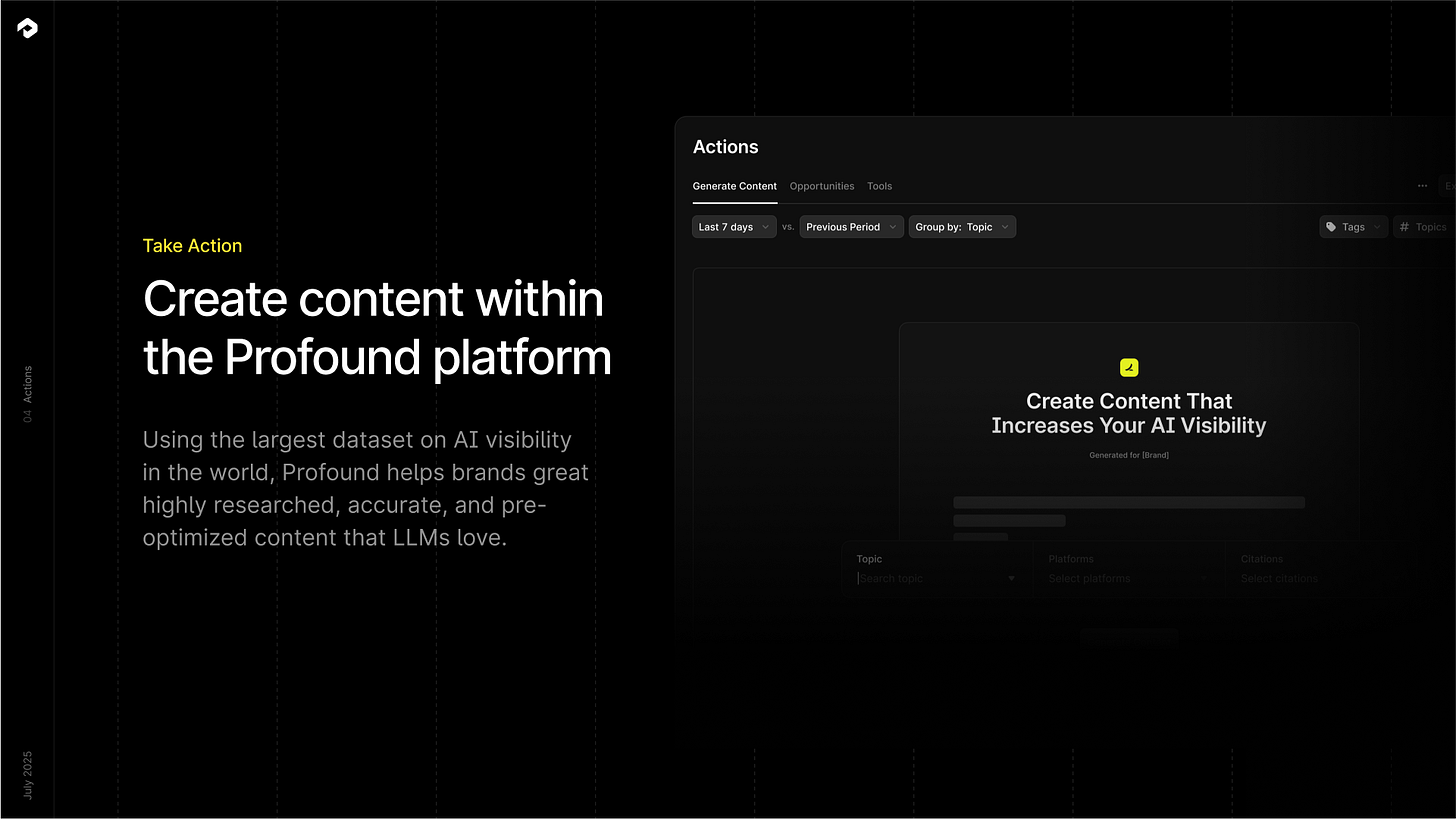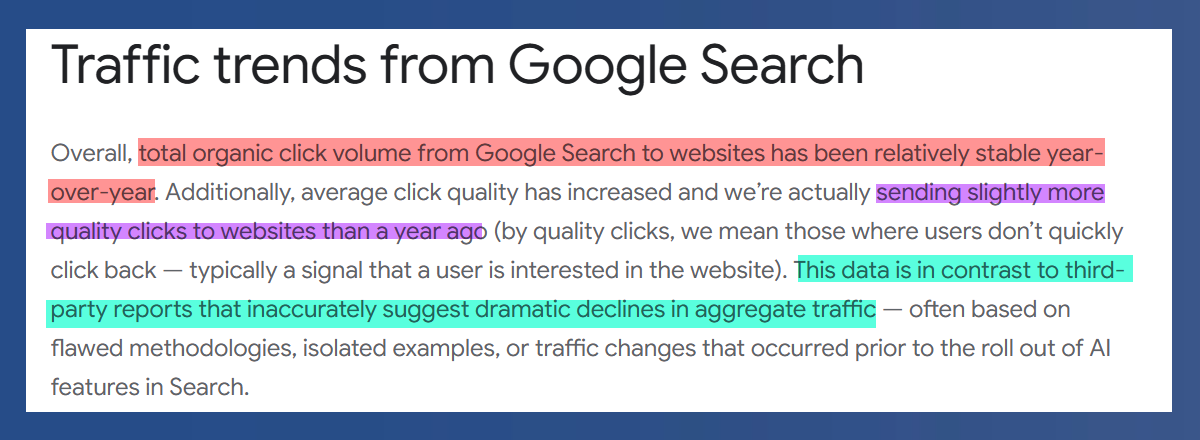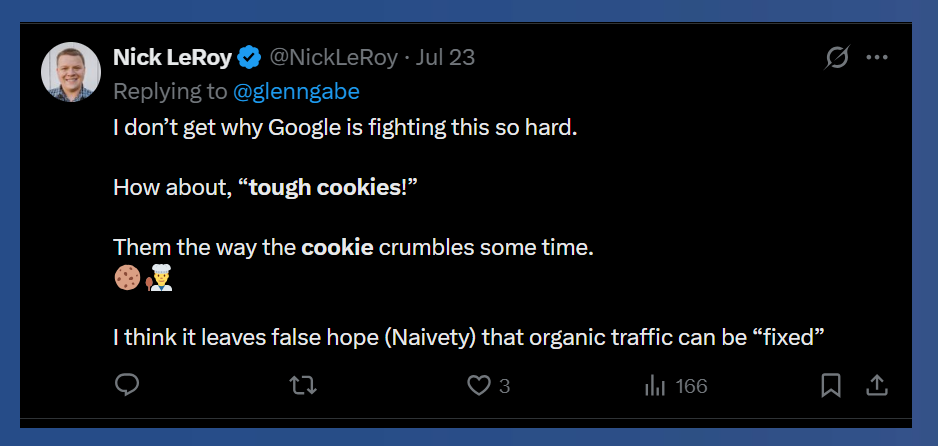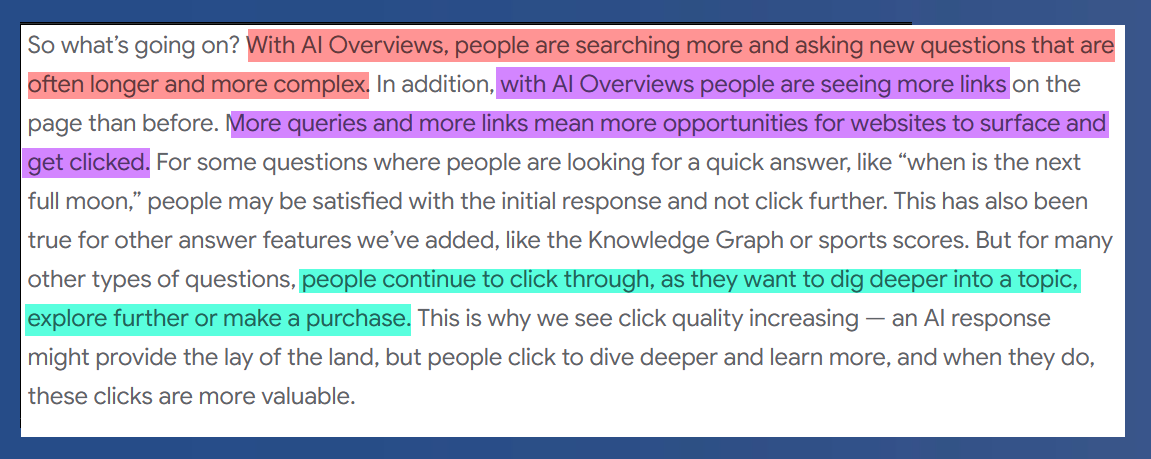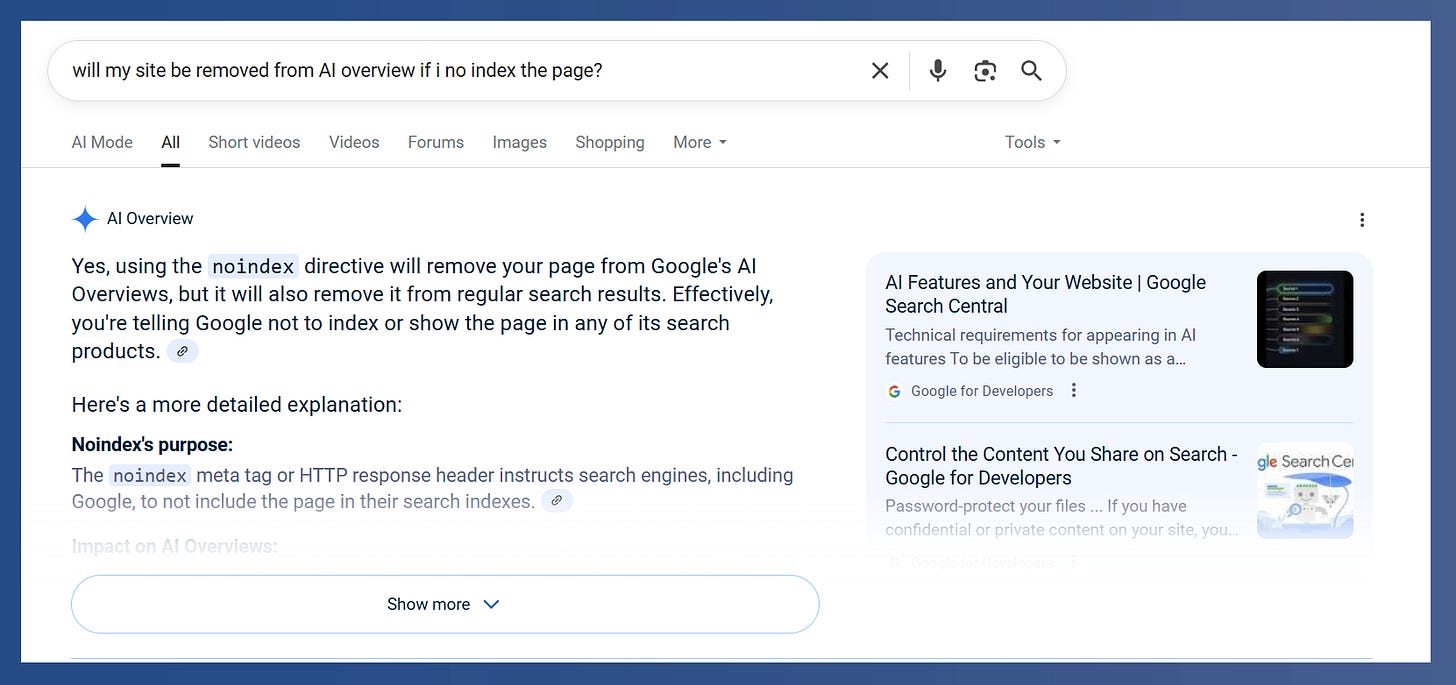Dear Google, I Love You, But You're Gaslighting Us
Your public statements are giving companies false hope in a search landscape that’s already changed.
This impromptu SEOFORLUNCH issue is sponsored by: ProfoundI’ve spent over 8 years sharing Google’s official statements and guidance in this newsletter. Sometimes they were helpful. Most of the time, the real message was buried between the lines.
I don’t blame Google’s spokespeople. It's an incredibly tough gig, balancing secrecy with the need to appear supportive of the SEO community. But let’s be real: the current messaging about “clicks are stable compared to last year” is absurd.
Google needs to pull its head out of the sand. Their legal team might be experts at phrasing things carefully, but no amount of PR spin can hide the reality unfolding in search
This #SEOForLunch Sponsor is Profound
Using the largest dataset on AI visibility in the world, Profound helps brands great highly researched, accurate, and pre-optimized content that LLMs love.
Generate content that matches your brand voice, product information and guidelines without manual oversight.
See it in action today.
Google’s PR Spin Isn’t Just Useless, It’s Harmful
Liz Reid, Head of Google Search, published a new post on the Google Blog titled “AI in Search is driving more queries and higher quality clicks.”
The content of the post, carefully and likely vetted by legal, is… what do the kids say? Cringe.
Liz writes about specific questions and statements alluding to Google significantly reducing the amount of organic clicks from its search results to websites. I wanted to highlight three particular parts of the paragraph below.
“Total click volume from Google Search to websites is stable YOY”
Notice the careful language being used here. I’ll refer to “They/Google” moving forward, since this clearly isn’t a personal note from Liz or any small group of Googlers.
Technically, they might be telling the truth. We know Google has ramped up internal linking within AIOs, which I suspect is propping up this so-called “stable click volume.”
But let’s be honest: they never claimed those clicks were to external websites. Just that total organic click volume is “stable.” Big difference.
“Slightly more quality clicks to websites than a year ago”
I’ll give them this one; it might be the most straightforward line in the whole piece.
Without a doubt, before AI and AIOs, websites were raking in a lot of low-quality, unqualified traffic. So yes, maybe Google is driving slightly more “qualified” clicks now.
Do I think there's value in low-intent traffic, too? Absolutely. But for the sake of this post, let’s give Google a point in the “truth” column and keep moving.
“Data is contrast to third-party reports… suggests dramatic declines…”
This is where I had to put the phone down (I was reading over lunch) and could practically hear the collective eye-roll from the search industry.
Again, I’m not saying they’re lying. But any experienced marketer knows you can use data in two ways:
To determine the performance narrative
Or to justify the performance narrative you’ve already chosen
The former reflects what’s really happening, the good, bad, or ugly. The latter? That’s cherry-picking data to sell whatever narrative fits best.
And let’s be honest: Google’s story doesn’t align with what the rest of us are seeing.
I’ve said it before, and I’ll repeat it again: not a single one of my clients would hesitate to open up their Search Console data to show a very different reality.
When You Spin the Data, You Spin the Truth
Growing up—like many reading this post—I was taught the difference between right and wrong. But Google? They’re playing in the murky middle. “Lying by omission” feels like an understatement when you're selectively showcasing data to prop up the story you want the public to hear.
And to be fair, I won’t pretend AI Overviews are useless. They can be genuinely helpful for quick answers—movie times, conversions, an actor’s age, game schedules. I use them too.
But let’s not confuse utility with impact.
Many in the search industry scream that AIOs have zero value. I think that’s extreme—and often a defense mechanism. Some SEOs are so jaded, so unwilling to pivot, they’d rather burn it all down than adapt.
Which brings me to a point I’ve made over and over again…
Why Not Just Admit This Is the Future of Search?
Most of us aren’t living under a rock. We get it, AI is the future of search. We don’t have to like it. Some of us are even burying our heads in the sand, hoping AIOs magically disappear.
But why swim against the current?
I get that Google doesn’t want to play the villain. Change is hard. It’s uncomfortable. And for most people, the unknown feels like a threat. But instead of leveling with the industry and acknowledging that this shift is real and yes, painful, Google leans into deflection.
They question third-party traffic reports. They dangle false hope that your organic traffic will bounce back “once they fix it.”
Spoiler: it’s not getting fixed. It’s evolving.
New is Scary but Doesn’t Have To Be Bad
Not everything in Liz’s post deserves to be scrutinized. Some points actually do give us a glimpse into the real direction of search.
“Searching more + asking new [longer/complex] questions…”
That checks out. As users grow more comfortable with AI-powered answers, they’re naturally asking more layered, nuanced questions. No beef there.
“People see more links on the page than before... more opportunities”
Sure. The links are there. But let’s not confuse visibility with viability. The AIO often satisfies the query upfront—so unless it’s wrong or incomplete, users aren’t clicking further.
Yes, technically, there’s opportunity. But let’s not pretend the likelihood of a click is unchanged. There’s a massive difference between “can” and “will.”
By that logic, there’s technically an opportunity for Google to link to SEOJobs.com in its official hiring an SEO guide. But something tells me this post didn’t land me on the holiday card list.
“People continue to click through for deeper analysis/purchase.”
Also true. For now, at least. I’m not anti-AIO. I’m not even here to rant about click reduction.
I’m just tired of watching lipstick get slapped on a pig while we’re told it’s a beauty queen.
Google: Let Us Use Your Content Or Get Out
Toward the end of this post, the real message finally bubbles to the surface.
Whether you’re Team AIO or not, Google lays out your “option”: don’t like it? Then opt out. The links are right there in the post—feel free to slap a noindex tag on your site and walk away. I dare you! 😉
This is as close as we’re going to get to Google admitting the future of SEO. They're not asking for permission anymore. They’re saying: play ball, or don’t play at all.
And just to twist the knife a little, even their own AI Overview hints that if you do opt out, don’t expect your content, or your site, to be surfaced much, if at all, in the future.
Translation: we're building the new search experience with or without you.
Google, Rip The Damn Band-Aid Off!
We get it, AI is the future. The search industry is in the middle of a massive pivot, and leadership confidence in the ROI of organic search is at an all-time low.
All we’re asking is for a bit of honesty. Just say it: clicks aren’t the primary success metric anymore. Will site owners, SEOs, and opportunists cheer? Probably not. But let’s not pretend your post didn’t already heavily allude to that reality.
We see where this is going. And like you, we’re adapting.
But give us some credit. The data we’re seeing isn’t wrong. The traffic drop-offs are real.
Validation isn’t weakness, it’s leadership. And right now, your silence is louder than your statements.



